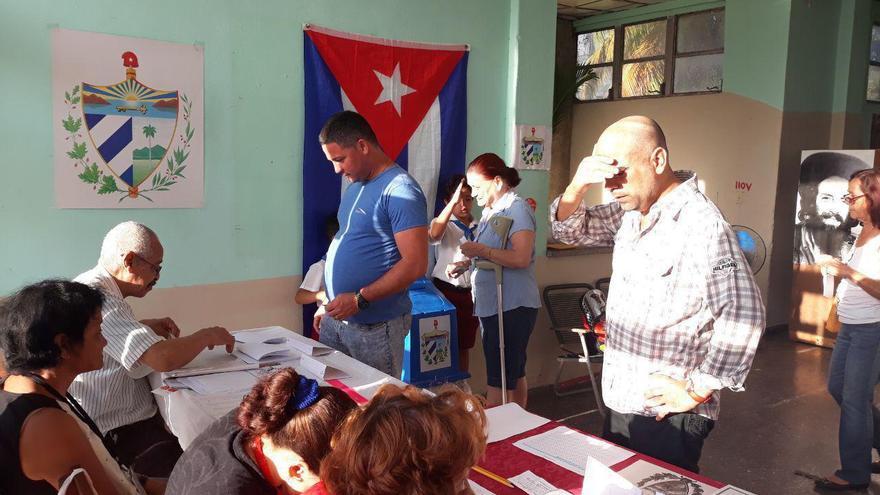
![]() 14ymedio, Reinaldo Escobar, Havana, 14 June 2019 — With no political campaigns, no diversity in platforms and no secret votes at the beginning of the process, Cubans could begin electing their representatives under the new Electoral Law that must be approved no later than October.
14ymedio, Reinaldo Escobar, Havana, 14 June 2019 — With no political campaigns, no diversity in platforms and no secret votes at the beginning of the process, Cubans could begin electing their representatives under the new Electoral Law that must be approved no later than October.
Thursday, the newspaper Granma published an interview with Orisell Richards Martínez, professor at the Faculty of Law of the University of Havana, speaking about what kind of roadmap the future rules would have to offer for the legislators to follow. Some of these changes are related to the election of the new positions of president and vice president of the Republic, members of the National Electoral Council, governors and provincial vice-governors.
Last April 10th, when the new Constitution of the Republic went into force, the countdown began for the “six-month span” within which the National Assembly of People’s Power (ANPP) has to approve the new Electoral law. By this coming July the deputies will probably have a first draft or, in its absences, form a commission to draft one.
In a marathon year of resolutions, laws and regulations to begin to adjust the current body of laws to the Constitution, the Electoral Law arouses speculation because it is the one that could influence the political direction of the country still more. A small change in one of its articles could mean the arrival of reformists in Parliament or greater orthodoxy among the assembly members.
The most significant aspect of the interview with Richards is the absence of forecasts of major transformations. Something that reinforces the widespread impression that it is better not to have illusions about democratic reforms in the new text. Everything points to the fact that proposals will be maintained with a show of hands in the base and the candidacy commissions, without allowing candidates to campaign or propose platforms.
Although these are the opinions and proposals of an academic who is not even a deputy, the fact that her words have been published in a prominent place in the official organ of the Communist Party, underlines its character of “official truth,” unlike the predictions of a specialist in the field. Hence, Richards’ words should be read as a preview of things to come.
For example, Richards suggests maintaining “the essence of elections at the municipal level,” which begins with a meeting in the areas of each constituency in which voters propose those who should appear on the ballot as candidates for delegates of the Municipal Assembly. In the sight of all and without the right to secret vote, the residents must enunciate the name of the possible delegate.
In the last meetings of this type carried out in 2018 several acts of repudiation and arrests of independent candidates took place, a true campaign of intimidation that meant that none of them managed to pass the test of the vote by show of hands, before the fear or the rejection of a citizenship influenced by threats and defamation campaigns.
Inertia extends to another of the most controversial aspects of the current Electoral Law: the existence of Candidacy Commissions that make up the list of candidates for deputies. This relationship, of about 600 names, corresponds to an equal number of seats in Parliament, so that the voter can only approve their election to the Assembly, but cannot choose among candidates.
The most audacious thing that the professor proposes is that the work of these commissions must be more transparent: “It is a question of expanding, from this normative disposition, in how the selection of pre-candidates is developed, based on what principles, what control mechanisms exist for it, in pursuit of the selection of the best proposals and information to the people.”
The demand that the presence of independent observers should be allowed in the elections will reduce, according to the forecasts published in Granma, the participation of supervisors and collaborators in the electoral processes, “without ignoring the principles for their incorporation, as well as their training.”
Obviously, the Law will maintain the right to participate in periodic elections, plebiscites and popular referendums among all citizens with legal capacity to do so. The vote will be free, equal, direct and secret, and each voter will be entitled to one vote, but Cubans who are abroad temporarily or as permanent residents will continue to be excluded.
When the principle of a single political party is enshrined in the Constitution, it is elementary that the new electoral law will not allow competition between candidates who offer different alternatives. As a result, the main obstacle to exercising the political will of citizens will be maintained.
The voters will go to the polls ignoring how the candidates think, because they will only be allowed to look at a photo and read an excerpt from their biography.
Neither the homosexual nor the homophobic will know in advance how each candidate will vote on a possible law that approves equal marriage. Both the private entrepreneur and the manager of a state-owned company won’t know the intentions of the candidates towards approving or rejecting the opening of small and medium-sized companies. The elderly worker about to retire and the young person who is beginning their working life will not know how the candidates will act when they have to vote on laws that balance pension expenses with taxes.
Silent candidates and deaf voters will continue to be the protagonists of these electoral pantomimes.
_______________
The 14ymedio team is committed to serious journalism that reflects the reality of deep Cuba. Thank you for joining us on this long road. We invite you to continue supporting us, but this time by becoming a member of 14ymedio. Together we can continue to transform journalism in Cuba.
